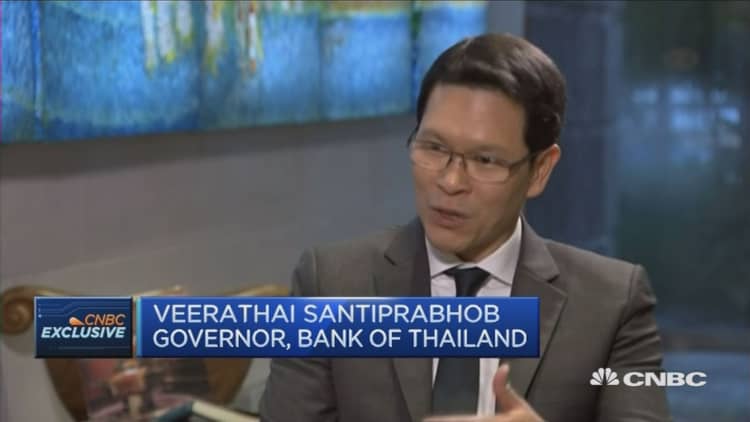Thailand's military has ruled the country for large parts since constitutional monarchy was introduced just over 80 years ago.
Its grip may be about to get stronger.
Two years after the military last seized power, Thailand's citizens will vote on a new draft of the constitution on Sunday that if approved, would entrench the army's power and further delay a return to civilian rule, strategists say.
In May 2014, Thailand witnessed its twelfth successful military coup since it became a constitutional monarchy in 1932. Army chief Prayuth Chan-o-cha was installed as Prime Minister, toppling the elected but controversial government of Yingluck Shinawatra and abolishing the existing constitution.
Prayuth, who referred to the coup as a peacekeeping effort aimed at ending political unrest, has said that democracy can only be restored once there is political stability, adding that the country would hold general elections once a new constitution was in place. The latter goal was tasked to the Constitution Drafting Commission (CDC), which Prayuth set up following the coup.
The CDC's first draft was rejected in September last year by the now-defunct National Reform Council (NRC), a body set up by Prayuth to oversee economic reforms, which further postponed elections. Now, the CDC has now produced a second draft that will be voted on this Sunday, August 9.
The referendum itself will not have any immediate impact on the country's political direction as the military will remain in control until the next election, regardless of Sunday's results, explained Prajak Kongkirati, visiting fellow at the Institute of Southeast Asian Studies (ISEAS), a Singapore-based research organization.
What's more important is the voting sentiment.
"If the draft constitution passes the referendum, Thailand will move towards semi-authoritarianism guided by the military. Such a result will also shore up the junta's rule," Kongkirati noted.
"But an overwhelming no vote would diminish the legitimacy of the junta and the traditional elites who have backed the regime...It will send a strong signal to the junta that it cannot unilaterally impose a new political regime without a genuinely participatory process."
The referendum's outcome is also directly tied to just how open elections will be in 2017.
Whether or not citizens support the new charter, Prayuth has said he will go ahead with general elections by late 2017. If the 'no' vote prevails on Sunday, the CDC will simply go back to work on another draft and in that scenario, the junta will be able install any kind of charter without the need for a public referendum.
But that could lead to widespread boycotts of the 2017 election, which isn't desirable for the military. So at this point, it's unknown whether the election will be free and fair or junta-influenced.
"The broader question for Thailand is how to move beyond military authoritarianism and get back on the track towards democratic development. However, until a new consensus is forged among opposing political parties and civil society groups, the prospect for a return to civilian rule remains dim," summed up Kongkirati.
Details of the new draft
Last year, lawmakers rejected the CDC's first draft because it endorsed the creation of a committee that would effectively grant the military power over the executive and legislative branches of government in a crisis situation.

This time, the new draft allows for indirect influence of the junta and "increases the hurdles to further amendments of the constitution," Morgan Stanley economists explained in a Tuesday report.
The military will be able to appoint senators to the Senate and install a non-member of parliament (MP) as Prime Minister. If the lower house of parliament is unable to resolve the PM's appointment, the Senate can step in to break any impasse, the report said.
A poll conducted last week by the National Institute of Development Administration—a Bangkok public university—revealed 59 percent of 1,500 respondents were undecided on the new charter, with 33 percent in favor and 6 percent against it.
Morgan Stanley doesn't anticipate a huge economic impact from the complex political situation.
"We think the economy is likely to muddle through the upcoming referendum and political schedule regardless of the referendum outcome. Policymakers are likely to adjust their response to provide floor support for the economy, the domestic demand show signs of being affected by near-term uncertainty."
International criticism
In the run-up ahead of the vote, human rights organizations have launched fierce criticism against the military for its crackdown on activists opposed to the new charter.
On July 27, military authorities arrested Tassanee Buranupakorn, the vice president of the Chiang Mai provincial administrative organization and former MP from the now-deposed Pheu Thai Party, for spreading false information about the constitution, Human Rights Watch (HRW) reported. Meanwhile, August 2 saw nineteen leaders of the pro-democracy 'Red Shirt' movement charged for violating a ban on political gatherings, according to Agence France Presse.
"The junta's use of its draconian sedition law against critics of the draft constitution creates a climate of fear ahead of the referendum," said Brad Adams, HRW's Asia director.
"The combination of sedition charges and military detentions [against dissidents] suggests that the junta wants to stifle information and turn up the heat on Thai voters so they accept a constitution that would prolong military control," Adams continued.

